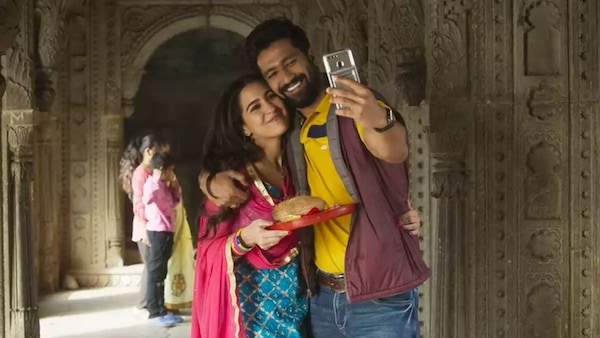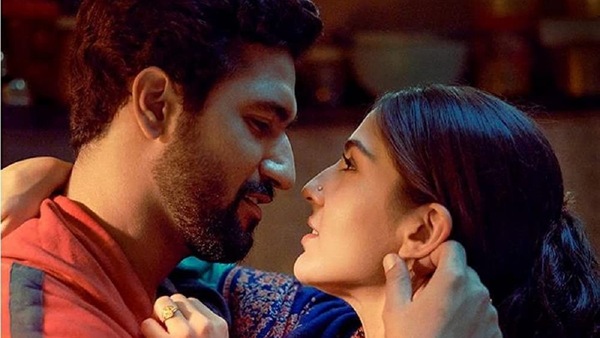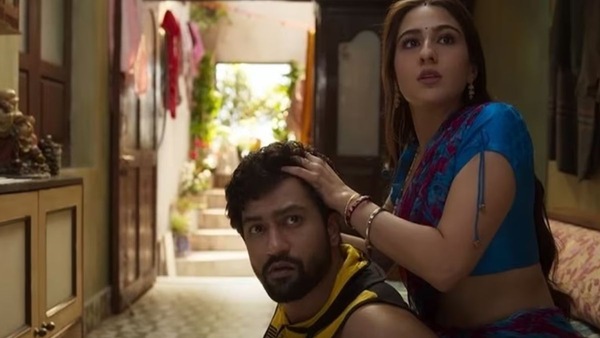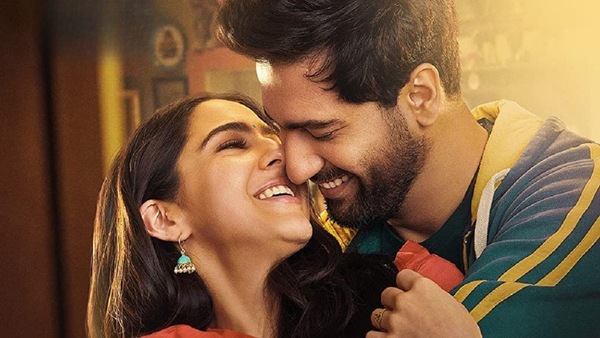Zara Hatke Zara Bachke: Luv Ranjan Called, He Wants His Script Back
This is #CriticalMargin, where Ishita Sengupta gets contemplative over new Hindi films and shows. Today: Vicky Kaushal, Sara Ali Khan's Zara Hatke Zara Bachke.

Last Updated: 01.54 PM, Jun 02, 2023
LET me start with a story. A newlywed couple lives happily together in Indore. She teaches at a coaching centre and he teaches yoga. He is an upper-caste, vegetarian Hindu and she is a non-vegetarian Sikh. Their love eases all differences. The only problem is they have no privacy. The house they live in has two bedrooms to spare which are occupied by his parents and uncle’s family. This compels them to sleep on the roof, putting their intimacy at the mercy of any onlooker who might intrude. Fairly enough they dream of building a home together. She is more adamant, her resolve making perfect sense when put in the context of her gender. In India, the space afforded to women is so finite that they have to fight for every inch. He is more laid back because he can afford to be — the place is his even without a room. They make elaborate plans to own their own abode. When it happens, she realises she had been a fool for wanting more from life. She apologises, he forgives. Somewhere a man called Luv Ranjan has the last laugh.
For the second time this year, the female protagonist in a Hindi film, traditionally a thematic punching bag and a narrative minority, is disciplined for desiring a better life. Also for the second time, that desire of hers is presented as the antithesis to an otherwise perfect family set-up headlined by a man. In quick succession, two male filmmakers woke up one morning and decided to pour out all their misogyny into a pot, stirring it with lurid humour, to make “family entertainers” which are by men, for men and of men. Laxman Utekar’s Zara Hatke Zara Bachke picks up right where Ranjan had left it with Tu Jhoothi Main Makkaar, a film that should be watched — only if one really has to — in Reels.

Three-film-old Utekar already has a type. The setting is always a small town, the chosen trope is confusion, and the subtext is regressive sexism. His first outing Luka Chuppi (2019), centered on a couple who fake marriage to stay in a live-in set up only to get married eventually, bore the seeds but his sophomore venture Mimi (2021) is where things got more pronounced. The film was a problematic take on surrogacy which freely used the crutch of emotional contrivances and melodrama to depict a protagonist who abandons her desire and ambition at the altar of motherhood. Because, that’s what women do. What else is their body for if not to conceive? It is easy to be deceived by the liberal themes he chooses (a live-in couple in Mathura, a single mother in Rajasthan) but if probed a little deeper, they reveal to be overcompensation for the narrow-mindedness his films thrive on. Utekar’s commitment to be woke is as flimsy as the man who writes ‘identify as a FeMiNisT’ on his Tinder bio. I digress.
His latest Zara Hatke Zara Bachke begins in Indore with a voice-over informing us how universal it is for human beings to want to have a home. A montage follows. Everything about this sequence, right from the random couples smiling while sitting outside their houses to the camera cutting to a bird’s nest, is so synthetic that it is marginally better than the home loan advertisements by banks. It gets worse, don’t worry. The focus then is on a crowded room. An anniversary celebration is underway and a cake is being cut. The dutiful woman of the house, the wife in the marriage everyone is celebrating, hands out pieces to the people gathered. They lap it up till someone detects there might be egg in it; everyone gags. What follows is an altercation where the problems faced by the couple (Kapil Dubey and Soumya Chawla Dubey — played by Vicky Kaushal and Sara Ali Khan) marking their second year of togetherness are quickly surmised: his family is not overly fond of her, especially his aunt, they feel she might have bought a non-veg egg in the Brahmin household out of spite. She retorts (girls in 2023 kind of do) saying the family is never pleased even when she is doing everything she can which includes, primarily, vacating her room for the aforementioned aunt and sleeping on the terrace with the husband.

I’ll come clean, I did not mind the first half. There were issues there but the film felt breezy. The laughs came easy, some jokes worked. Sure, it unfolded as a textbook reiteration of the Hindi-films-based-in-small-towns template where a set of quirky parents are essayed by seasoned actors (in this case Akash Khurana and Anubha Fatehpura, and Rakesh Bedi and Sushmita Mukherjee), the problems are circumstantial and the humor is situational. There is one standout side character (in this case Inaamulhaq as the broker) who keeps things afloat. But little quirks helped. For one, having Kaushal always does. The actor is so effortless that even his mere presence can uplift regular moments. His character, Kapil, is shown to be a miser of sorts and he plays on his comic strengths, making a full-fledged person out of what could have easily been a caricature. There is a scene where the waiter returns him the one rupee he had left as a tip. The actor takes the coin back with absolute sincerity, making the moment work despite the familiarity.
I also liked that it was the woman who was unwavering in her desire to buy a house, refusing to back down in the face of her husband’s emotional pleas. When they chance upon a government scheme that makes it easier for a certain strata of low-income people to own a house, Soumya is the one who jumps in. They hatch a plan, aided by the shady broker, of taking a divorce so that it makes her eligible, a woman who doesn’t have a property in her name, to apply for it. It is easy to see where the film will go from here and despite some logical loopholes (like, why not talk with the family about wanting to stay separately without going through this ordeal?) and technical problems (the background music nearly deafened my ears) I was prepared to see a coming-of-age story of a woman. The make-believe separation will lend her an identity, the farce of a divorce will help her see herself for who she is. How does all this build-up work? It doesn’t.

The second half is where the film becomes enraging from being occasionally annoying. The one-line premise is stretched too far and then the plot scatters faster than my teenage heart ever did. Not only does the film not take the route I was expecting (which of course is fine) but it introduces an absolute bonkers subplot — actually two — that make no sense even as half-formed ideas. The implication angered me more than the incompetence. Suddenly, the intent of the film becomes clear, which all along was to punish the woman for dreaming of something as basic as a house of her own. It was to make the woman repentant for voicing her needs and wanting a better life for her husband and herself. It was to villanise her for having an ambition. In the process, the outing redeems everyone who was nasty to her, introduces a Muslim character only to treat her feelings as a joke, and seeks to salvage the protagonist by making them sound like tone-deaf agents of a chit fund. Honestly, of all the things I had expected from the film, I did not foresee it to be offensive on the grounds of gender, religion, caste and class.
If after all this, your question is why I have not mentioned Sara Ali Khan once, it is because I was saving it for the last. Her character Soumya Chawla Dubey is a classic case of a man-writing-a-woman. She is feisty, loving, aggressive and understanding. If Shraddha Kapoor’s character from TJMM had a sister who grew up in a small-town, Soumya would be her. By no stretch of imagination is the role written well. But there is also something to be said of Khan’s performance which operates on a different level of excess. Even when she thinks, she acts. Her face is always emoting as if she is constantly looking at a mirror, dialling up her reactions to ‘see’ how she would look. In the first half, when the couple play-act being estranged before the families, given the divorce is underway, she reprises her Love Aaj Kal 2 portrayal. Something in me was taken by her self-awareness. Maybe she knows what a bad performance looks like. Then, she continued exaggerating even when the problem was real and so were the fights. There is a close-up of hers, crying while eating a chocolate. That image is burnt in my head.
In more ways than one Zara Hatke Zara Bachke is what happens when a man binges on Ranjan’s filmography, looks at his bickering family with fondness and tells his wife, “but adjust, no”. It is written by men (Utekar, Maitrey Bajpai and Ramiz Ilham Khan are credited), dedicated to men and will be used by men every time a woman voices her desire to be treated better or just have a room of her own. Use the film’s title as a warning — move aside and beware.

